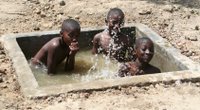
Kulenga is one of the new congregations planted as a result of this summer’s medical mission. During the clinic days at Singwamba, the Kulenga headman came for treatment. He needed hospitalization, so Dr. Hamby provided money and transportation for the headman to be taken to the hospital in Livingstone. Unfortunately, the headman later died, but the village was touched by the kindness shown to him and asked for someone to start a church at Kulenga. Daniel Mweemba, the tireless church leader at Singwamba, took on the challenge, and the Kulenga congregation has been meeting for six weeks now.
We visited this new group last Sunday. Peter Mufwafwa, a teacher at the secondary school, joined us as David’s translator, and Peter’s wife, Mary, also came with us. I asked Vera, one of the secondary pupils, to come along as my translator.
Vera is one of the 38 needy orphans who are able to attend Namwianga Christian Secondary School because a sponsor in the USA pays her tuition. She is the top student in grade 12 and the top math student in the entire school. As if that weren’t enough, her poise and beauty would make her a shoe-in for the Miss Zambia competition. Vera is an outstanding young woman, and I looked forward to getting to know her on this trip.
The jolting, dusty ride into the bush ended at a spot where the congregation was meeting in the shade of a huge tree. Makeshift seating was made of poles laid across v-shaped sticks. A gentle breeze kept the temperature pleasant for the forty or so worshipers.
Since it was a new congregation, we had brought the communion supplies with us. I fixed a cup of watered down wine, tore a chipate (Indian equivalent of a tortilla) into pieces, and communion was ready. Daniel led the meditation at the Lord’s Supper and another young man led the singing.
When David got ready to preach, Vera and I took the 14 children to the shade of another tree for our Bible lesson. As soon as we began, I knew we faced a challenge. Vera, I found out, is from the Lozi tribe, not Tonga, and speaks Nyange as her first language. She only learned Chitonga two years ago. Well, Nyange and Chitonga are similar, so with a little extra time and lots of pointing at the pictures I was using we were able to communicate with the little ones. The children who were school age could understand my English, so they helped the younger ones as well. The hour flew by, and we finished by giving the children a coloring sheet and crayons. This always produces some excitement, especially when I tell them that they can keep the three crayons in the zip lock bag they were given!
After the service and our customary meal of nshima and chicken, we went around one last time to shake hands and say our farewells. When I came to Daniel, I asked him, “How many congregations have you planted since the medical mission?”
He looked apologetic as he answered, “Only five.” This is a man who goes from village to village on his bicycle, who has no telephone, no copy machine, no secretary, no budget, and is paid no salary. Yet he is disappointed that he has only planted five congregations in two months! Praise God for the Daniel Mweembas in the kingdom, and may God raise up many more like him.




